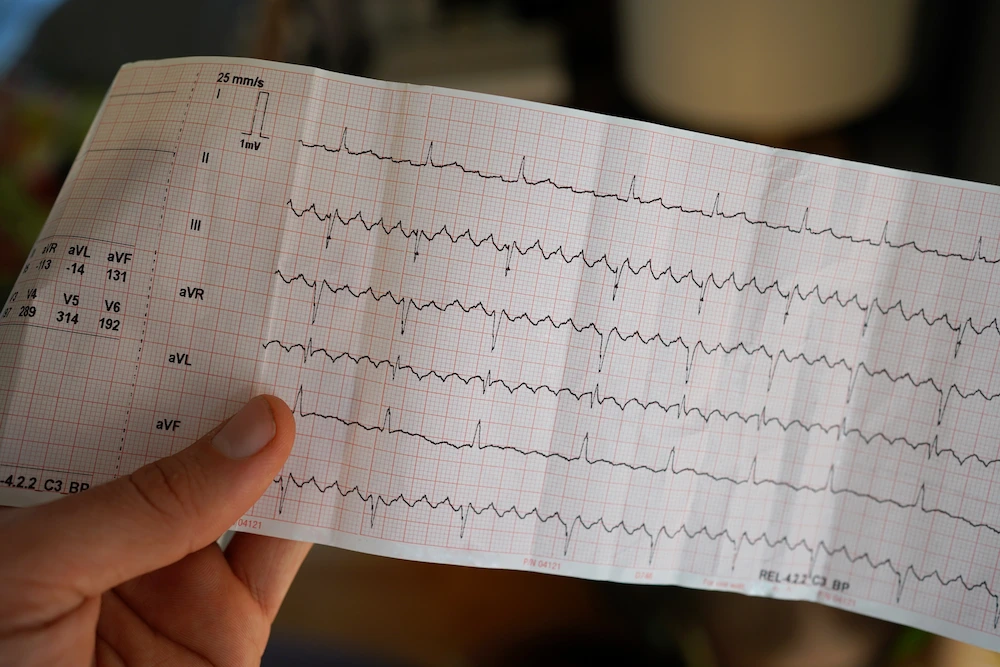Atrial Fibrillation: When to Go to the Hospital

Atrial fibrillation (AFib), a common heart rhythm disorder, can cause your heart to beat irregularly and often rapidly. While many people with AFib experience minimal symptoms, it’s crucial to recognize when the condition becomes concerning and warrants immediate medical attention.
This article aims to help Miami residents with AFib understand when their condition might be dangerous and when a trip to the hospital is necessary. We’ll also explore the potential complications of AFib and guide you towards seeking appropriate care from a primary care doctor in Miami.
Understanding Atrial Fibrillation
AFib occurs when the upper chambers of your heart (the atria) beat chaotically and irregularly, out of coordination with the lower chambers (the ventricles). This can lead to a variety of symptoms, including:
- Heart palpitations: A feeling of fluttering or pounding in your chest.
- Rapid heart rate: Your heart might feel like it’s racing.
- Shortness of breath: Difficulty breathing or feeling like you can’t catch your breath.
- Dizziness or lightheadedness: May occur due to decreased blood flow to the brain.
- Fatigue or weakness: Your heart working inefficiently can lead to tiredness.
- Chest pain or discomfort: In some cases, AFib can cause chest pain, especially if it’s associated with a rapid heart rate.
Atrial Fibrillation: When to Go to the Hospital
While AFib itself is not always a medical emergency, certain situations require immediate attention. Seek immediate medical help if you experience:
- Severe chest pain or discomfort: This could indicate a heart attack or other serious cardiac condition.
- Shortness of breath that worsens rapidly: Difficulty breathing or feeling like you can’t get enough air.
- Fainting or loss of consciousness: A sudden loss of consciousness can be a sign of a serious heart rhythm problem.
- Signs of a stroke: These include sudden weakness or numbness on one side of the body, facial drooping, slurred speech, or vision problems.

AFib with RVR: A Concerning Combination
AFib with RVR (rapid ventricular response) occurs when the irregular heartbeats in AFib also cause the lower chambers of your heart (ventricles) to beat very fast. This can lead to more severe symptoms and increase the risk of complications.
What is a Dangerous Heart Rate with AFib?
A dangerous heart rate with AFib varies depending on the individual and their overall health. However, a heart rate consistently above 150 beats per minute (bpm) can be concerning and might require medical intervention.
Atrial Fibrillation Symptoms at Night: Disrupting Sleep
AFib symptoms can sometimes worsen at night, disrupting your sleep and leading to fatigue and other health problems. If you experience nighttime AFib symptoms, consult your doctor in Miami for guidance on managing your condition.
Can AFib Be Cured?
While there’s no guaranteed cure for AFib, various treatment options can help manage symptoms, control heart rate, and reduce the risk of complications:
- Medications: To regulate heart rhythm, prevent blood clots, and control heart rate.
- Procedures: Such as cardioversion (an electrical shock to restore normal rhythm) or catheter ablation (to destroy abnormal electrical pathways in the heart).
- Lifestyle changes: Maintaining a healthy weight, managing stress, and avoiding triggers like caffeine or alcohol can help reduce AFib episodes.
Primary Care Doctor in Miami: Your Partner in Heart Health
If you have AFib or experience any concerning heart-related symptoms, it’s essential to consult with a primary care doctor in Miami. They can:
- Monitor your condition and assess your risk factors.
- Recommend appropriate lifestyle changes.
- Prescribe medications or refer you to a cardiologist for specialized care.
Key Takeaways:
- AFib is a common heart rhythm disorder that can cause a variety of symptoms, including heart palpitations, shortness of breath, and dizziness.
- Seek immediate medical attention if you experience severe chest pain, shortness of breath, fainting, or signs of a stroke.
- If you have AFib, consult a primary care doctor in Miami for ongoing monitoring and management.
Remember, this article is intended for informational purposes only and should not be considered a substitute for professional medical advice. If you have any concerns about your health or are experiencing symptoms of AFib, consult a qualified healthcare professional.
FAQs: Atrial Fibrillation When to Go to the Hospital
- Is it normal to experience occasional heart palpitations with AFib? Yes, occasional heart palpitations or a fluttering sensation in your chest can be normal with AFib. However, if the palpitations are frequent, persistent, or accompanied by other symptoms like shortness of breath or dizziness, it’s important to consult your doctor in Miami.
- Can stress or anxiety trigger AFib episodes? Yes, stress and anxiety can trigger or worsen AFib episodes in some individuals. Managing stress through relaxation techniques, such as deep breathing or meditation, might help reduce the frequency of AFib episodes.
- I’ve been diagnosed with AFib. What lifestyle changes can I make to manage my condition? Several lifestyle modifications can help manage AFib, including:
- Maintaining a healthy weight
- Regular exercise
- Limiting alcohol and caffeine intake
- Avoiding smoking
- Managing stress
- What are the potential complications of untreated AFib? Untreated AFib can increase your risk of stroke, heart failure, and other cardiovascular complications. It’s crucial to seek medical attention and follow your doctor’s recommendations for managing your condition.
- How can I find a cardiologist in Miami who specializes in AFib treatment? Your primary care doctor in Miami can provide a referral to a qualified cardiologist. You can also search online for “cardiologist near me in Miami” or “AFib specialist Miami” to find healthcare professionals in your area.
Contact Us
Hiriart & Lopez MD, LLC
9950 SW 107th Ave STE 101,
Miami, FL 33176
305-274-8779
Phone: (305) 274-8779
Fax: (305) 274-0646
OPENING HOURS
Monday 7:30 AM–4:30 PM
Tuesday 7:30 AM–4:30 PM
Wednesday 7:30 AM–4:30 PM
Thursday 7:30 AM–4:30 PM
Friday 7:30–11 AM
Saturday Closed
Sunday Closed
OFFICE LOCATION
Atrial Fibrillation: When to Go to the Hospital

Atrial fibrillation (AFib), a common heart rhythm disorder, can cause your heart to beat irregularly and often rapidly. While many people with AFib experience minimal symptoms, it’s crucial to recognize when the condition becomes concerning and warrants immediate medical attention.
This article aims to help Miami residents with AFib understand when their condition might be dangerous and when a trip to the hospital is necessary. We’ll also explore the potential complications of AFib and guide you towards seeking appropriate care from a primary care doctor in Miami.
Understanding Atrial Fibrillation
AFib occurs when the upper chambers of your heart (the atria) beat chaotically and irregularly, out of coordination with the lower chambers (the ventricles). This can lead to a variety of symptoms, including:
- Heart palpitations: A feeling of fluttering or pounding in your chest.
- Rapid heart rate: Your heart might feel like it’s racing.
- Shortness of breath: Difficulty breathing or feeling like you can’t catch your breath.
- Dizziness or lightheadedness: May occur due to decreased blood flow to the brain.
- Fatigue or weakness: Your heart working inefficiently can lead to tiredness.
- Chest pain or discomfort: In some cases, AFib can cause chest pain, especially if it’s associated with a rapid heart rate.
Atrial Fibrillation: When to Go to the Hospital
While AFib itself is not always a medical emergency, certain situations require immediate attention. Seek immediate medical help if you experience:
- Severe chest pain or discomfort: This could indicate a heart attack or other serious cardiac condition.
- Shortness of breath that worsens rapidly: Difficulty breathing or feeling like you can’t get enough air.
- Fainting or loss of consciousness: A sudden loss of consciousness can be a sign of a serious heart rhythm problem.
- Signs of a stroke: These include sudden weakness or numbness on one side of the body, facial drooping, slurred speech, or vision problems.

AFib with RVR: A Concerning Combination
AFib with RVR (rapid ventricular response) occurs when the irregular heartbeats in AFib also cause the lower chambers of your heart (ventricles) to beat very fast. This can lead to more severe symptoms and increase the risk of complications.
What is a Dangerous Heart Rate with AFib?
A dangerous heart rate with AFib varies depending on the individual and their overall health. However, a heart rate consistently above 150 beats per minute (bpm) can be concerning and might require medical intervention.
Atrial Fibrillation Symptoms at Night: Disrupting Sleep
AFib symptoms can sometimes worsen at night, disrupting your sleep and leading to fatigue and other health problems. If you experience nighttime AFib symptoms, consult your doctor in Miami for guidance on managing your condition.
Can AFib Be Cured?
While there’s no guaranteed cure for AFib, various treatment options can help manage symptoms, control heart rate, and reduce the risk of complications:
- Medications: To regulate heart rhythm, prevent blood clots, and control heart rate.
- Procedures: Such as cardioversion (an electrical shock to restore normal rhythm) or catheter ablation (to destroy abnormal electrical pathways in the heart).
- Lifestyle changes: Maintaining a healthy weight, managing stress, and avoiding triggers like caffeine or alcohol can help reduce AFib episodes.
Primary Care Doctor in Miami: Your Partner in Heart Health
If you have AFib or experience any concerning heart-related symptoms, it’s essential to consult with a primary care doctor in Miami. They can:
- Monitor your condition and assess your risk factors.
- Recommend appropriate lifestyle changes.
- Prescribe medications or refer you to a cardiologist for specialized care.
Key Takeaways:
- AFib is a common heart rhythm disorder that can cause a variety of symptoms, including heart palpitations, shortness of breath, and dizziness.
- Seek immediate medical attention if you experience severe chest pain, shortness of breath, fainting, or signs of a stroke.
- If you have AFib, consult a primary care doctor in Miami for ongoing monitoring and management.
Remember, this article is intended for informational purposes only and should not be considered a substitute for professional medical advice. If you have any concerns about your health or are experiencing symptoms of AFib, consult a qualified healthcare professional.
FAQs: Atrial Fibrillation When to Go to the Hospital
- Is it normal to experience occasional heart palpitations with AFib? Yes, occasional heart palpitations or a fluttering sensation in your chest can be normal with AFib. However, if the palpitations are frequent, persistent, or accompanied by other symptoms like shortness of breath or dizziness, it’s important to consult your doctor in Miami.
- Can stress or anxiety trigger AFib episodes? Yes, stress and anxiety can trigger or worsen AFib episodes in some individuals. Managing stress through relaxation techniques, such as deep breathing or meditation, might help reduce the frequency of AFib episodes.
- I’ve been diagnosed with AFib. What lifestyle changes can I make to manage my condition? Several lifestyle modifications can help manage AFib, including:
- Maintaining a healthy weight
- Regular exercise
- Limiting alcohol and caffeine intake
- Avoiding smoking
- Managing stress
- What are the potential complications of untreated AFib? Untreated AFib can increase your risk of stroke, heart failure, and other cardiovascular complications. It’s crucial to seek medical attention and follow your doctor’s recommendations for managing your condition.
- How can I find a cardiologist in Miami who specializes in AFib treatment? Your primary care doctor in Miami can provide a referral to a qualified cardiologist. You can also search online for “cardiologist near me in Miami” or “AFib specialist Miami” to find healthcare professionals in your area.
Contact Us
Hiriart & Lopez MD, LLC
9950 SW 107th Ave STE 101,
Miami, FL 33176
305-274-8779
Phone: (305) 274-8779
Fax: (305) 274-0646
OPENING HOURS
Monday 7:30 AM–4:30 PM
Tuesday 7:30 AM–4:30 PM
Wednesday 7:30 AM–4:30 PM
Thursday 7:30 AM–4:30 PM
Friday 7:30–11 AM
Saturday Closed
Sunday Closed

